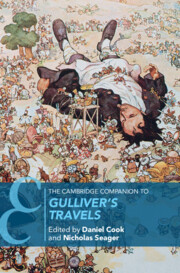Book contents
- The Cambridge Companion to Gulliver’s Travels
- The Cambridge Companion to Gulliver’s Travels
- Copyright page
- Contents
- Figures
- Notes on Contributors
- Abbreviations
- Note on the Text
- Chronology
- Introduction
- Part I Contexts
- Part II Genres
- Part III Reading Gulliver’s Travels
- Chapter 9 Advertisements and Authorship
- Chapter 10 A Voyage to Lilliput
- Chapter 11 A Voyage to Brobdingnag
- Chapter 12 A Voyage to Laputa, Balnibarbi, Luggnagg, &c.
- Chapter 13 A Voyage to the Land of the Houyhnhnms
- Part IV Afterlives
- Further Reading
- Index
- Cambridge Companions to Literature
Chapter 9 - Advertisements and Authorship
from Part III - Reading Gulliver’s Travels
Published online by Cambridge University Press: 05 October 2023
- The Cambridge Companion to Gulliver’s Travels
- The Cambridge Companion to Gulliver’s Travels
- Copyright page
- Contents
- Figures
- Notes on Contributors
- Abbreviations
- Note on the Text
- Chronology
- Introduction
- Part I Contexts
- Part II Genres
- Part III Reading Gulliver’s Travels
- Chapter 9 Advertisements and Authorship
- Chapter 10 A Voyage to Lilliput
- Chapter 11 A Voyage to Brobdingnag
- Chapter 12 A Voyage to Laputa, Balnibarbi, Luggnagg, &c.
- Chapter 13 A Voyage to the Land of the Houyhnhnms
- Part IV Afterlives
- Further Reading
- Index
- Cambridge Companions to Literature
Summary
This chapter analyses the material that precedes the chapter summaries and the main narrative of Gulliver’s Travels. It establishes that the purpose of the prefatory material, both verbal and visual, is to make the reader uncertain whether or not they are reading a true story. The purpose of that is to tease and vex the reader, with the broader satirical intention of calling into question the very concept of truth. Swift is pointing out that human beings are systematically perverting language so as to express intentionally untrue statements, chronic mendacity, and its destabilisation of the linguistic system being a manifestation of human corruption. The chapter examines political lying in the early eighteenth century, then literary lying in prose fiction, situating Gulliver as a critique of reader-credulity and ‘absorptive’ reading encouraged by novels. The chapter explains the aims of the text and its preliminaries in their 1726 and 1735 states.
- Type
- Chapter
- Information
- The Cambridge Companion to Gulliver's Travels , pp. 111 - 124Publisher: Cambridge University PressPrint publication year: 2023

